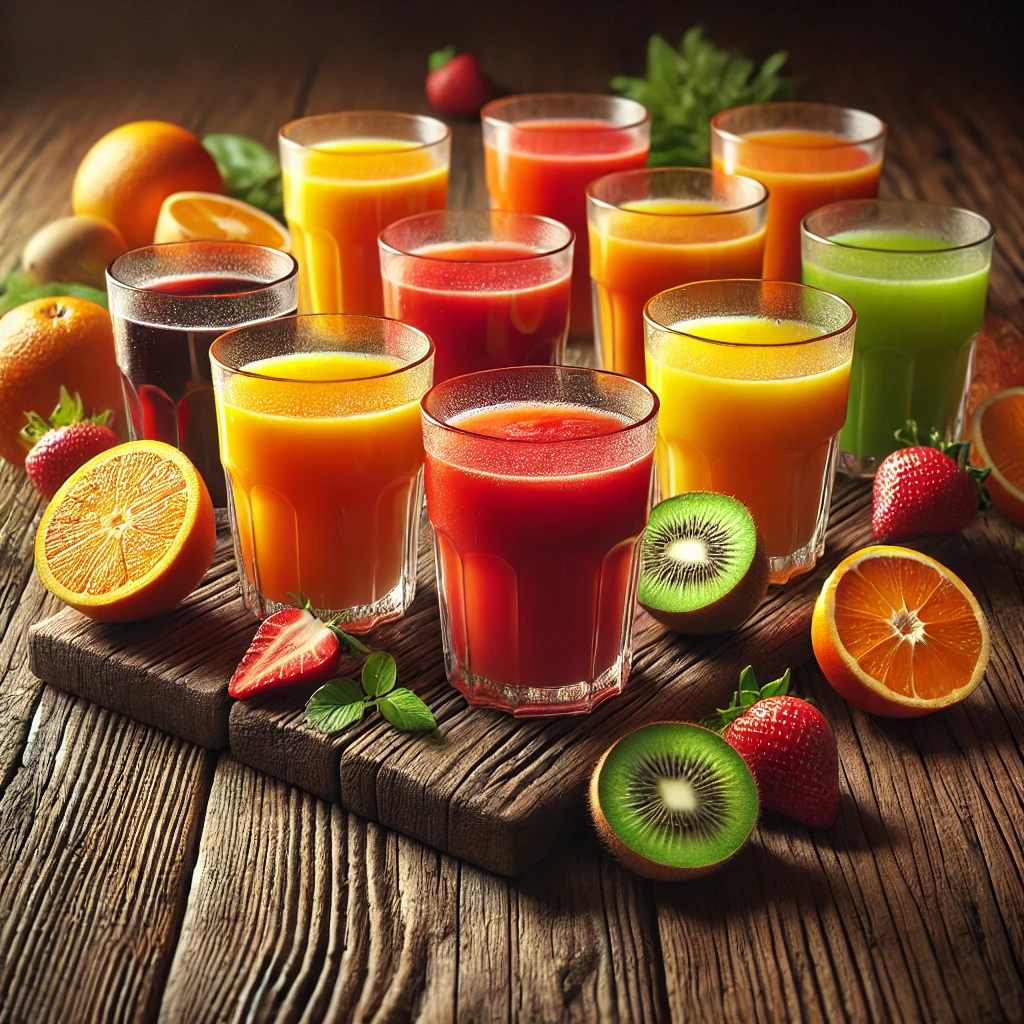Table of Contents
Advantages of Fasting
Fasting is often used as a natural way to cleanse the body, but it doesn’t have to mean complete food deprivation. In reality, modified fasts, which limit certain foods rather than eliminating them entirely, are safer and more sustainable.
Modern research shows that intermittent fasting (IF) and other fasting methods offer a wide range of health benefits, including:
✅ Weight loss
✅ Lower cholesterol levels
✅ Better blood sugar control
✅ Reduced inflammation (which helps prevent arthritis, asthma, heart disease, and even cancer)
Since chronic inflammation is a leading cause of many health issues, fasting can be a powerful tool for long-term wellness and disease prevention.
Intermittent Fast, Juice Fast, or Water Fast?
There are different types of fasting, each with its own benefits. Here’s a quick breakdown:
🕑 Intermittent Fasting (IF) – You eat during a specific time window and fast for the rest of the day. Popular methods include:
✔ 16/8 method (fast for 16 hours, eat within 8 hours)
✔ 5:2 method (eat normally for 5 days, restrict calories for 2 days)
✔ Alternate-day fasting (fast every other day)
🍊 Juice Fasting – Only consuming fresh fruit and vegetable juices for a set period. This provides nutrients while giving your digestive system a break.
💧 Water Fasting – The most extreme type, where only water is consumed for a set duration. This is often done for short periods and should be approached with caution.
Each fasting method has unique benefits—choosing the right one depends on your health goals and lifestyle! 🚀
Cleansing Diet: A Form of Modified Fasting
A cleansing diet is a gentler approach to fasting, focusing on eating cleaner rather than eliminating food completely.
✅ How It Works:
If your normal diet includes processed foods and meat, switching to a plant-based diet for a period of time counts as cleansing. Similarly, if you’re an ovo-lacto vegetarian, temporarily adopting a vegan diet can serve as a cleanse.
🚫 What to Avoid:
- Processed foods
- Sugar
- White flour & wheat
- Dairy (as it can be difficult to digest for some)
This method allows your body to reset and detoxify without the intensity of complete fasting. A great way to rejuvenate your health without feeling deprived! 💚
Intermittent Fasting (IF): A Flexible Approach to Eating Less
Intermittent fasting (IF) is a widely practiced method that limits food intake in specific ways to promote better health.
🔹 Popular IF Methods:
✔ 5:2 Method – Eat 500 calories two days a week, eat normally on other days.
✔ Time-Restricted Eating (TRE) – Limit eating to a set time window each day (e.g., 8-hour eating window, 16-hour fast).
✔ Nighttime Fasting – Avoid food for 3+ hours before bed for better digestion and metabolic benefits.
✔ 12–14 Hour Daily Fast – The simplest method: stop eating after dinner and wait until breakfast to eat again.
🔹 Why It Works:
- Helps with weight loss
- Improves blood sugar control
- Reduces inflammation
- Supports digestive health
Intermittent fasting is flexible and can be adjusted based on your lifestyle! Would you try it? 😊

Stricter Intermittent Fasting Protocols
For a more structured approach, some IF methods involve tighter eating windows, allowing the body to stay in a fasted state longer for greater benefits.
🔹 Common Eating Windows:
✔ 8-hour window – Eat from 10 AM to 6 PM or 12 PM to 8 PM (16-hour fast).
✔ 6-hour window – Eat from 12 PM to 6 PM (18-hour fast).
✔ 4-hour window – Eat from 2 PM to 6 PM (20-hour fast).
The longer the fasting period, the more the body shifts into repair and detoxification mode—helping with fat loss, cell regeneration, and inflammation reduction.
⚠️ Who Should Avoid Stricter IF?
🚫 Pregnant women
🚫 Individuals who are frail or underweight
🚫 Those with diabetes or blood sugar issues
Intermittent fasting is a powerful tool but should be tailored to individual needs. Would you try a stricter fasting window or stick to a more flexible approach? 😊
Juice & Broth Diets: A Milder Approach to Fasting
Juice and broth diets are gentler alternatives to strict fasting. They provide essential nutrients while allowing the body to focus on detoxification and repair without the extreme stress of starvation.
🔹 Benefits of Juice & Broth Fasts:
✔ Provides easily digestible nutrients
✔ Boosts energy levels and supports detoxification
✔ Encourages cell repair without depleting the body
⚠️ Why Avoid Water-Only Fasting?
🚫 Can stress the body and trigger survival mode
🚫 May cause fatigue, weakness, and nutrient depletion
🚫 Less effective at flushing toxins than nutrient-supported fasts
When NOT to Fast:
🚫 If you’re weak, recovering from surgery, illness, or chemotherapy
🚫 If you have diabetes or blood sugar regulation issues
🚫 If you’re already underweight or depleted
For safe cleansing, it’s better to nourish and support the body rather than starve it. Would you consider a juice or broth fast as a gentle detox method? 😊
Gentle Ways to Detoxify Without Fasting
Want to cleanse your body without extreme fasting? Try these gentle yet effective detox methods:
🔹 1. Hydrate for Natural Detoxification
💧 Drink 2–4 cups of warm water first thing in the morning to stimulate digestion and elimination.
💧 Aim for at least 8 more glasses throughout the day to flush out toxins.
🔹 2. Psyllium for Colon Cleansing
🌿 Take 1–3 teaspoons of psyllium husks daily with plenty of water for 2–4 weeks.
✔ Supports healthy digestion and helps remove waste buildup.
✔ May also help lower cholesterol and regulate blood sugar.
🔹 3. Triphala for Digestive Support
🍃 A powerful Ayurvedic remedy for gut health and detoxification.
✔ Take 2 tablets with water on an empty stomach in the morning.
✔ Use for 6–8 weeks each spring to maintain bowel health.
By adding these natural cleansing habits to your routine, you can support your body’s detox processes without the stress of fasting! Would you like recommendations on easy detox recipes? 😊

How to Do a Juice Fast 🍏🥕🥤
Want to try a gentle, nourishing cleanse? Follow this simple guide to a 1–3 day juice fast:
🔹 When & How Much to Drink
Drink 8–12 ounces of fresh vegetable and fruit juice every 3 hours:
✅ Morning: 8:00 AM & 11:00 AM
✅ Afternoon/Evening: 2:00 PM & 5:00 PM
✅ Optional: If hungry at 8:00 PM, have a small serving
💧 Drink water or herbal teas between meals to stay hydrated.
💧 Aim for 2–3 liters (8–12 cups) of fluids per day.
🔹 How Long to Juice Fast?
✔ 1–3 days is ideal.
❌ Stop immediately if you feel dizzy, weak, or lightheaded—this is a sign to eat solid food.
🔹 How to Recover After a Juice Fast
The key is gentle reintroduction of solid foods:
🥣 For the same number of days you fasted, eat lightly:
✔ Start with grains, cooked veggies, and fruit
✔ Slowly reintroduce beans, eggs, nuts, fish, or poultry
✔ Wait a few days before consuming red meat, fried foods, dairy, or sweets
💧 Hydrate well and allow your body to rest and reset after your cleanse.
Would you like juice recipes or tips on choosing the best ingredients? 😊
Fasting: Unlocking Your Body’s Natural Healing 🌿✨
Fasting allows your body to tap into its own cleansing and healing abilities, promoting health and vitality.
🔹 Repeating a Juice Fast
✅ You can repeat a juice fast every month, but always listen to your body!
✔ If you feel energized and refreshed → Keep going!
❌ If you feel weak or drained → Adjust:
- Shorten the duration
- Include more substantial nutrients
- Fast less frequently
Your body knows best—nourish it wisely! 🥤💚 Would you like guidance on the best juices for different health goals? 😊
Boosting Health, Energy & Passion for Life 🌿✨
In today’s fast-paced, consumer-driven world, it’s easy to feel weighed down by excess food, chemicals, and stress. But the good news? Fasting and mindful eating can help reset your body and mind!
🔹 Small Changes, Big Impact!
✔ Ditch sugar, wheat, or dairy for a few weeks—see how your body responds!
✔ Drink more water and stay hydrated 💧
✔ Finish eating by 6:00 p.m. to allow better digestion & sleep 🌙
If you’re ready for a deeper cleanse, go for it! Even a simple broth fast can leave you feeling lighter, clearer, and more in tune with your body’s needs.
Wishing you a refreshing detox that fills you with energy, clarity, and passion for life! 💫✨ Have you tried fasting before? How did it make you feel? 😊
Final Thoughts: Is Intermittent Fasting Right for You?
Intermittent fasting isn’t just a passing trend—it’s a scientifically backed approach to better health. From weight management to improved metabolism and heart health, it offers numerous benefits.
But remember: fasting isn’t for everyone. It’s important to listen to your body, choose a method that suits your lifestyle, and consult a healthcare professional if you have health concerns.
When done correctly, intermittent fasting can be a powerful tool for enhancing well-being, increasing longevity, and fostering a healthier relationship with food.
